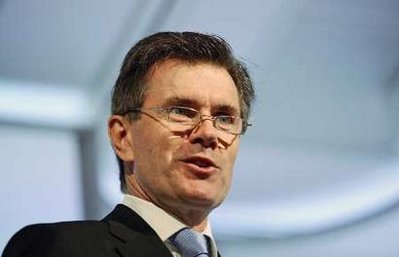Global General
In first, British spy chief goes public
(Agencies)
Updated: 2010-10-28 17:34
 |
Large Medium Small |

| Britain's Secret Intelligence Service (SIS) chief John Sawers addresses a live televised gathering of academics, officials and editors in London, Oct 28, 2010. [Photo/Agencies] |
LONDON - Britain's top spy made the first public speech by a serving UK espionage chief on Thursday, a step towards greater openness for an intelligence service that for most of the 20th century did not officially exist.
Following are key points from the speech by Secret Intelligence Service (SIS) chief John Sawers:
Iraq war lessons
"The Butler Review following Iraq was a clear reminder, to both the Agencies and the centre of Government, politicians and officials alike, of how intelligence needs to be handled."
"The SIS Board recently reviewed our implementation of Lord Butler's recommendations, to make sure we've implemented them fully, in spirit as well as substance. I am confident that they have been. And we will look at the wider issues again once the Chilcott Inquiry reports."
Al qaeda
"Al Qaeda have ambitious goals. Weakening the power of the West. Toppling moderate Islamic regimes. Seizing the Holy Places of Islam to give them moral authority. Taking control of the Arab World's oil reserves. They're unlikely to achieve these goals, but they remain set on trying, and are ready to use extreme violence."
Islamic world governance
"Over time, moving to a more open system of government, one more responsive to people's grievances, will help. But if we demand an abrupt move to the pluralism that we in the West enjoy, we may undermine the controls that are now in place. The terrorists would end up with new opportunities."
"Whatever the cause or causes of so-called Islamic terrorism, there is little prospect of it fading away soon."
Iran and nucelar proliferation:
"The revelations around Iran's secret enrichment site at Qom were an intelligence success. They led to diplomatic pressure on Iran intensifying, with tougher UN and EU sanctions which are beginning to bite. The Iranian regime must think hard about where its best interests lie."
"The risks of failure in this are grim."
Afghanistan
"We are building up the Afghan security service, already probably the most capable of the Afghan security institutions, to help the Afghans take responsibility for their own security."
Torture
"Torture is illegal and abhorrent under any circumstances, and we have nothing whatsoever to do with it. If we know or believe action by us will lead to torture taking place, we're required by UK and international law to avoid that action. And we do, even though that allows the terrorist activity to go ahead."
Need for secrecy:
"If our operations and methods become public, they won't work."
"Agents take risks. They will not work with SIS, will not pass us the secrets they hold, unless they can trust us not to expose them."
"Without secrecy, there would be no intelligence services, or indeed other national assets like our Special Forces. Our nation would be more exposed as a result."